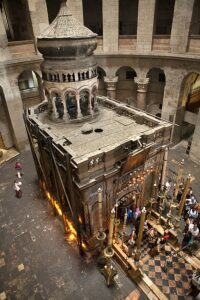With thanks to CAMERA Arabic for research.
Reuters, which promises “independence, integrity and freedom of bias” in news gathering, is digging down on the false claim that the Hashemite Kingdom of Jordan is the custodian of Christianity’s holy sites in Jerusalem.
In his Jan. 24 article, Suleiman Al-Khalidi erroneously reported: “Jerusalem is a particularly sensitive issue for Jordan’s Hashemite royal family as it is the custodian of Muslim and Christian holy sites in the eastern part of the city” (“King Abdullah meets Israeli PM Netanyahu in surprise Jordan visit, royal court says“).

Church of the Holy Sepulchre (Photo by israeltourism, CC BY 2.0, via Wikimedia Commons
Indeed, BBC Arabic recently apologized and corrected after twice publishing the same error, referring to “King Abdullah II, custodian of Jerusalem’s Muslim and Christian holy places…” (May 10, 2021) and indirectly referred to Jerusalem’s “Muslim and Christian” holy places as one, in the context of Israeli and Jordanian approaches towards them, as though the two religions’ sanctuaries belong in the same category in both parties’ eyes (May 16). BBC acknowledged that “Jordan’s custodianship (or special role) in Jerusalem’s holy site… extends to Muslim sites only.”
When presented with this information, Reuters continued to insist that Jordan is the custodian, asserting, “The Jordanian Hashemite royal family’s custodianship of Muslim and Christian holy sites in Jerusalem dates back to British-ruled mandatory Palestine in 1920s.” Furthermore, said the news agency, “In 2013, after the Oslo peace accord between Israel and the Palestinians, an agreement between Jordan and the Palestinian Authority recognized Jordan’s role in Jerusalem’s Muslim and Christian holy sites.”
Reuters’ claim that the Hashemites’ custodianship of Christian holy sites in Jerusalem dates back to the British Mandate is incorrect. Hashemite custodianship of Muslim sites dates back to the 1920s, but the family’s custodianship over Christian sites was the result of Jordanian legislation dating to the 1950s. Moreover, that legislation (subsequently annulled in 1988, as explained below) established Jordanian custodianship over the holy sites of just one Christian sect — the Greek Orthodox sect. Indeed, the only reference to Christian holy sites in 2013 PA agreement Reuters cited is limited to the Greek Orthodox church:
Based on the role of the Sharif Hussein bin Ali as a protector and caretaker of the holy places in Jerusalem and their buildings since 1924 […] the guardianship over the holy places has reached [the hands of] His Majesty King Abdullah II bin Hussein including the Greek Orthodox Patriarchate of Jerusalem, that is subject to Jordanian Law No.27 of the year 1958. (Preamble, Article IV, emphasis added.)
In the 1920s, a Christian country controlled the Mandate, and other Christian countries (France, Sweden, Greece, Ethiopia) had footholds with their religious sites. Thus, Christians, unlike Muslims, did not need the Muslim Hashemite family to safeguard their religious sites.
Moreover, in 1988, Jordan disengaged legally and administratively from the West Bank (including Jerusalem), retaining custodianship only over the Muslim holy sites. As an official memorial site to former King Hussein documented in 1988:
Recognizing the desirability of supporting the Palestinians in their struggle for independence, on July 28, 1988, King Hussein announced the cessation of a $1.3 billion development program for the West Bank, explaining that the measure was designed to allow the PLO more responsibility for the area. Two days later, he formally dissolved Parliament, ending West Bank representation in the legislature. Finally, on July 31 he announced the severance of all administrative and legal ties—with the exception of guardianship over the Muslim Holy Sites of Jerusalem—with the occupied West Bank. (Emphasis added.)
Thus, while Jordan retained its custodianship over Muslim holy sites, it renounced its custodian status over the Christian sites in 1988.
Significantly, not a single Christian country regards Jordan as custodian of Christian sites in Jerusalem. Not even Greece, which is tied to the aforementioned Greek Orthodox church, considers Jordan a custodian of that church’s holy sites. Reuters also argued that “various Christian bodies have recognized Abdullah’s custodianship, including the Vatican.”
With Reuters failing to substantiate the alleged Vatican recognition, it seems that the Vatican reserves the title “custodians” to members of the Catholic Franciscan order, and has been doing so since at least the 14th century.
The only example of a Christian body recognizing Jordanian custodianship was the Greek Orthodox Patriarch of the Holy City, Jordan and Palestine Theophilos III, who addressed King Abdullah in a 2018 sermon, saying, “For You, Your Majesty, the King of the beloved Jordan, are the Custodian of the Islamic and Christian holy sites in Jerusalem, including the Holy Sepulchre and the Greek Orthodox Patriarchate of Jerusalem.”
While the Palestinian Authority does consider Jordan to be custodian of Christian sites, the PA is neither a) a country nor b) Christian, and furthermore has no official status in Jerusalem. What authority, then, does it have on the issue? It is likewise unclear what legal or political basis the Saudi-based Organization of Islamic Cooperation has to determine who guards Christianity’s Jerusalem holy sites.
Reuters also pointed to Jordan’s 2016 financing of renovations in Christ’s tomb as evidence of custodianship. Yet King Abdullah’s generous funding of the repairs does not make Jordan a custodian any more than donor Mica Ertegun is a custodian.
